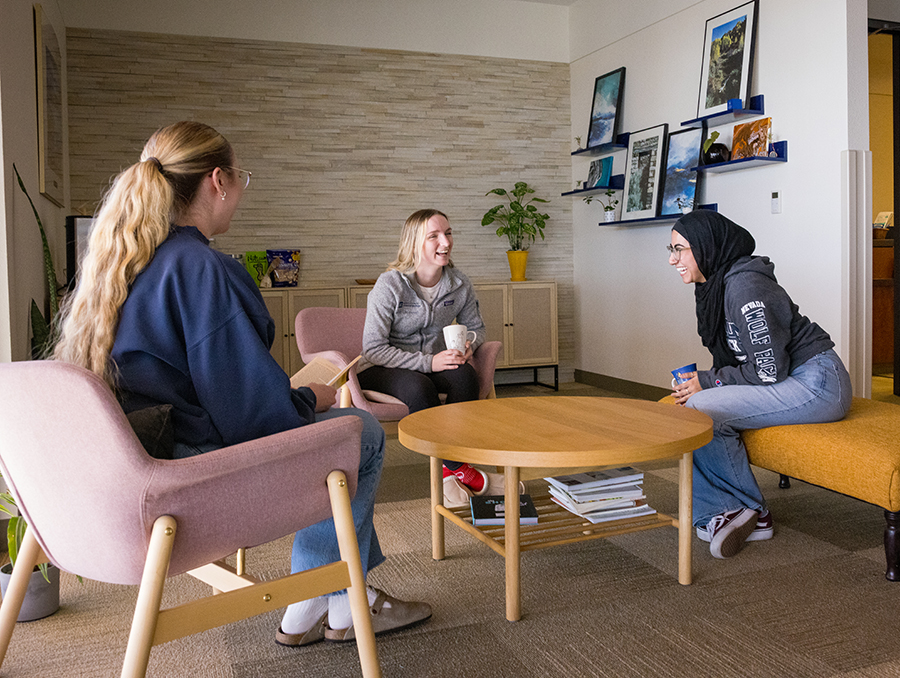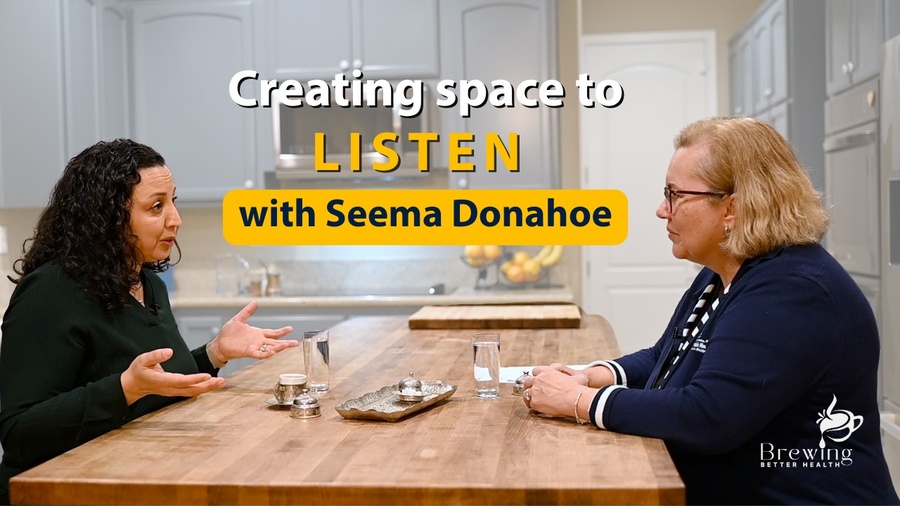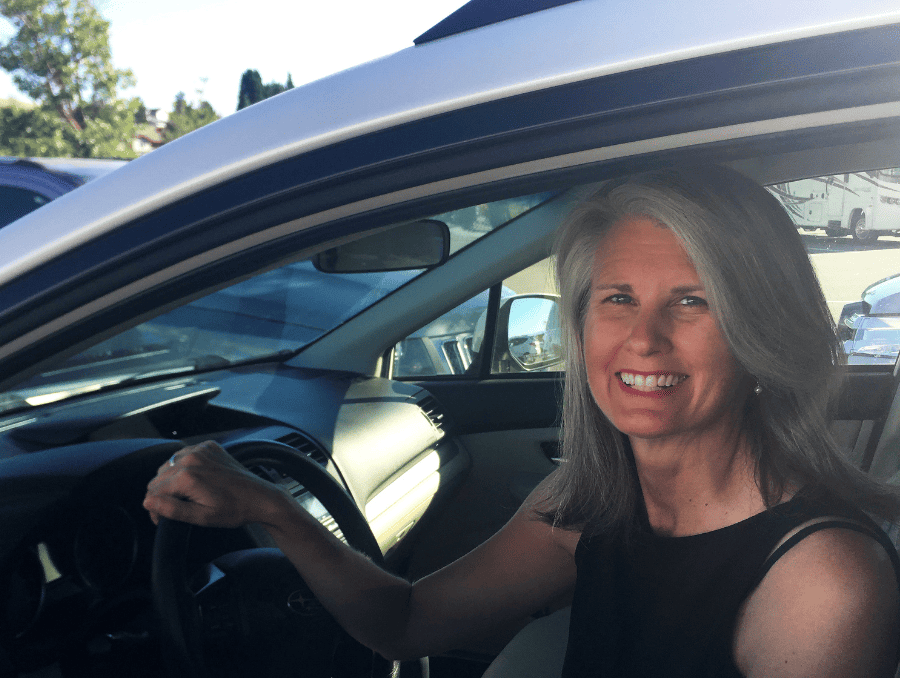The Learning and Wellness Resource Center serves as a central hub of support for M.D. and Pathway Program learners at the University of Nevada, Reno School of Medicine (UNR Med). Bringing learning and wellbeing professionals together in one shared space fosters a warm, welcoming environment where students can easily access the support they need. As key points of connection, these professionals provide guidance and resources that support both academic success and personal wellness.
“We hope that students feel a sense of belonging and comfort in the space, and that they can easily drop in between classes to connect with peers and staff,” said Carrie Murphey, director of M.D. Student Affairs. “Sometimes, just stepping away from the buildings where their classes take place can offer a much-needed reset for busy pre-med and M.D. students.”
This spring, the Learning and Wellness Resource Center moved to the Center for Molecular Medicine building on the University of Nevada, Reno campus. The Center’s new location and expanded capacity represent a meaningful step forward in integrating student support into the fabric of medical education at UNR Med. This evolution reflects a shift from reactive help-seeking to a more proactive, holistic approach to student wellbeing.
“We work hard to ensure that students see the learning and wellness resources offered in the Center as an essential part of their medical education—not just something to turn to in times of challenge,” Murphey added. “We want every student to intentionally build learning and wellness practices into their journey toward becoming a physician.”
Learning support tailored to students
The Learning and Wellness Resource Center is designed to support students as whole individuals—recognizing that personal well-being, academic success, and professional development are all deeply connected.
The Center comprises the learning support and wellness functions for Pathways Program (Post-Bac, Bridge) and M.D. students. For Pathways students, their dedicated Learning Specialist, Mandy Holley, has her office in the Center and they also have dedicated program space where students can gather and study or connect.
“Participating in the Bridge program and working with a learning specialist has been incredibly valuable in preparing me for the academic rigor of medical school,” said Natalie Dennis, who is set to matriculate into the M.D. program this fall. “Looking back on my undergraduate experience, I realized I didn’t always seek help when I needed it—whether academically or personally. Now, I understand how vital community support is to both my personal and professional growth.”
Guided learning at every step
M.D. students also benefit from assigned Learning Specialists who provide personalized support. Specialists Lisa Kornze and Roxanne Piskel work closely with students, offering guidance on everything from study strategies to time management.
“When I was a new MS1, it was incredibly comforting to have someone to lean on while I figured out how to approach learning such a vast amount of information,” Allison Gunderson, second-year medical student, said. “Now, as I prepare for the next big challenge—Step 1—it’s just as reassuring to know they’re still there to help me refine my strategies and stay on track.”
Gunderson also highlighted the impact of the Center’s recent relocation and transformation. “The new space has truly transformed accessibility and convenience for students. It offers a welcoming place to relax, refill a coffee, or even play a quick game during study breaks. My favorite part, though, has been the addition of new study areas... It’s the perfect place to get in some focused study time, enjoy a light snack, or have a supportive conversation.”
Mental health and wellness, embedded in the experience
In addition to learning support, the Center is home to UNR Med’s M.D. Wellness Program Counselor, Elizabeth Wesseling, who provides individual therapy, wellness programming, and transition support throughout the academic journey. Students can access counseling both in person and via telehealth, particularly during their clinical years.
“The Learning and Wellness Resource Center has been incredibly helpful in navigating the challenges of medical school, especially when it comes to managing stress,” said Gunderson. “Whether it's a mindfulness session, therapy dog visit, or creative activity, these events have helped me stay grounded and maintain a healthier work-life balance.”
Fellow second-year medical student Emily Bernamonti, echoed the importance of the Center’s environment. “There are days when the stress can feel overwhelming, but knowing there's a space where I can breathe, laugh, and reset has made a huge difference... It reminds me that taking care of myself is just as important as taking care of others.”
Bernamonti added, “I personally have found the arts and crafts themed events some of the most beneficial programs… Having even a short time to take a break and focus on something fun—like making an air plant holder or decorating cupcakes—really helps reset my mind. It gives me a much-needed break, and I get to take home something I created!”
A space built on compassion and connection
More than a physical space, the Center is defined by the people who staff it—professionals committed to walking alongside students through the ups and downs of their medical education journey.
“I cannot emphasize enough just how incredible the staff of the Learning and Wellness Resource Center are!” Bernamonti said. “Their kindness and warmth are truly what makes the center such a welcoming place.”
Third-year medical student Skotti Torrence agreed: “I think the best part of the entire program is really the staff. We are lucky to have them!”
Torrence also appreciated the embedded wellness support. “Being able to stop in for a quick chat with a licensed therapist has been incredible... Elizabeth cares so much about students’ wellbeing and it truly shines through.”
Fostering belonging and building resilience
All programs offered through the Center—from therapy and peer support groups to wellness workshops and social gatherings—are evidence-based and designed to reduce isolation and build resilience. These efforts are grounded in a belief that connection is crucial to both mental health and academic success.
“By creating a supportive community through various initiatives, we aim to foster connections among students, reducing feelings of loneliness, and encourage a sense of belonging,” said Wesseling.
“Our medical students face significant stressors,” she added, “including academic pressure, burnout, imposter syndrome, and emotional fatigue from academic and clinical experiences... Our embedded wellness program addresses these challenges by offering on-site and off-site counseling, resilience workshops, mindfulness activities, and peer support initiatives.”
Learn more about the UNR Med Learning and Wellness Resource Center
















